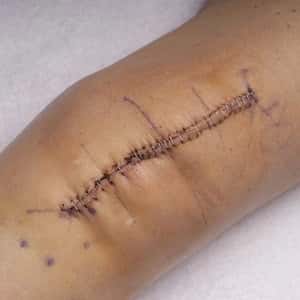
Hip and knee replacement surgeries are growing at an extraordinary rate. The American Academy of Orthopedic Surgeons (AAOS) reports that in 2014 there were 370,770 hip replacement surgeries and 680,150 total knee replacements (2018 AAOS Annual Meeting) It’s a growth industry. That’s because aging baby boomers want to stay active. Joint replacement offers them a second chance to keep moving without unbearable pain. But there is a risk. Blood clots in leg veins are common after surgery. But there is a way to prevent blood clots and potentially life-threatening complications.
Blood Clots After Knee Replacement Are Dangerous
Blood clots are always serious. It has been reported that symptomatic and asymptomatic blood clots after hip or knee replacement surgery can reach as high as 60%. That is if proper prophylaxis is not implemented (Arthroplasty Today, Sept. 2018).
When a blood clot forms in the deep veins of the legs it can break loose and lodge in the lungs. That is called a pulmonary embolism (PE). There is a significant risk of death when that happens. That’s why it is critical that doctors take action to prevent blood clots. A new study suggests that aspirin is just as good as pricey anticoagulants to prevent blood clots
A Reader Shares What Happened Without Prevention:
Q. I had a full right knee replacement. Within 24 hours post-surgery, I had blood clots in both calves. I was immediately put on Coumadin.
I was changed from Coumadin to Xarelto after a few months and have been on it ever since, along with a daily low dose aspirin.
I have no idea what Xarelto and daily aspirin are doing to my body. All my physicians say that I must stay on it for the rest of my life because once you have a blood clot, you are then at higher risk for more.
How to Prevent Blood Clots:
A. We are shocked that you did not receive medicine to prevent blood clots prior to or immediately after your knee replacement. That is now considered standard practice.
A study published in JAMA Surgery (online, Oct. 17, 2018) demonstrated the importance of prevention when planning a knee replacement. The researchers tracked 41,537 Michigan patients who underwent knee replacement surgery (aka total knee arthroplasty or TKA). They all received some sort of anticoagulant treatment. It was administered either one day before surgery, the day of surgery or one day after surgery.
Aspirin Was “Noninferior” to Anticoagulants
Surprisingly, aspirin was just as effective as drugs like rivaroxaban (Xarelto), warfarin (Coumadin) or low-molecular-weight heparin. Doctors have a strange (and to us convoluted) way of saying that. They love to use the word noninferior. The authors concluded that:
“In this study of patients undergoing TKA [total knee arthroplasty], aspirin was not inferior to other anticoagulants in the postoperative rate of VTE [venous thromboembolism or blood clots in veins] or death.”
In normal English, they found that regular old aspirin was comparable to anticoagulant drugs such as the aforementioned Xarelto, apixaban (Eliquis), argatroban (Acova), edoxaban (Savaysa) or dabigatran (Pradaxa).
They go on to praise aspirin:
“There are several reasons to prefer using aspirin for VTE prophylaxis in the appropriately screened patient. Aspirin administration is simple, safe, and does not require monitoring…Aspirin is also much less expensive. The reported cost for a 30-day supply of rivaroxaban is approximately $379 to $450, and that of LMWH [low-molecular-weight heparin] is estimated at $450 to $890. Warfarin costs a few dollars for a 30-day course, but with monitoring considered, the cost approaches that of the other anticoagulants. In contrast, aspirin costs approximately $2 per month, and no monitoring is needed.”
The Bottom Line:
The most important sentence in this study for people undergoing knee replacement treatment is:
“The results emphasize the need for chemoprophylaxis vs no prophylaxis to reduce the risk of VTE, given the dramatically higher odds of a VTE in the group without prophylaxis.”
What that means is that anyone undergoing knee replacement surgery should receive preventative treatment with an anticoagulant. That will reduce VTE or venous thromboembolism or blood clots in veins in the legs. If we are to believe this research, aspirin would be as effective as other anticoagulant medications.
For This Reader:
You may have to continue on an anticoagulant indefinitely. This is something your doctor will need to review periodically since all anticoagulant medications pose a risk of bleeding.
Share your own story about hip or knee replacement. How did it go? Did you have any complications. Let others benefit from your experience in the comment section below.

